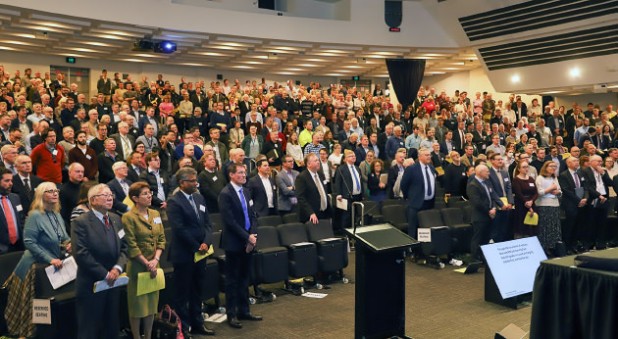After two years of work, a mountain of feedback and the best part of three days’ discussion at this year’s Synod, members are now set to pass a new diocesan governance policy.
On Wednesday night, the deputy chairman of the governance policy review committee, former CEO of Anglicare Greg Hammond, explained that the goal of the committee had been to strengthen the Diocese’s schools, colleges, welfare and aid organisations, and other groups covered by the policy, “to enable them and their governors and CEOs to pursue gospel priorities, their mission and purpose, doing so consistently with the doctrine of the Diocese”.
He added that since the adoption of the Diocese’s first policy a decade earlier, practices and governance had evolved considerably. As a result, “the [new] policy and governance standards not only reflect contemporary governance thinking and practice, they have also been framed having regard to the reality that our organisations are not-for-profit entities, charities, religious institutions and Anglican – in particular, Sydney Anglican – in character”.
The new policy has been expanded to include almost all diocesan organisations, and a new nomination process has been created to help confirm the faith of potential governors and CEOs before any appointment or election. Key statements such as the doctrine of the Diocese will also be made more easily accessible by being placed on the Sydney Anglicans website.
In addition, after feedback from members last year, the review committee split the old policy in two: creating one governance policy for parishes and another for organisations and schools.
Tiered policy
Three appendices have been added to the policy to define the four levels of organisations and schools, outline the governance standards applicable to each, and provide a statement and commitment for elected or appointed governors and leaders to sign.
Synod agreed on Monday that the latter should include a statement of personal faith. Added to this is a commitment to organisational faithfulness – and it is this segment of the statement that will apply to the small proportion of governors and leaders not appointed by the Diocese (usually alumni of Anglican schools), who do not profess faith.
Bishop Chris Edwards, the chairman of the committee, told Synod members that the statement included a “commitment to ensure the purposes of the organisation will be pursued in a manner which is consistent with the doctrine of the Diocese.
“That's a significant change. It’s important to understand the rigour of this statement. Because now we're asking people who lead and govern organisations to stick with our doctrine, to commit to using their powers in line with their constitution, within the law, and in accordance with our ordinances. And that they will abide by the governance standards [in the policy].”
He added that if the conscience or beliefs of a governor or leader changed so they could no longer agree with the statement or abide by the commitment they had made, they should resign from their position.
Synod voted not to include a paragraph on biblical marriage in the statement and commitment, agreeing that the governance policy was not the place for it. However, following this decision a motion was passed confirming biblical marriage “in keeping with the teaching of Scripture, the Book of Common Prayer and previous resolutions of this Synod and of the General Synod”.
The governance policy passed officially on Monday, September 23 – Synod’s next sitting day.






















